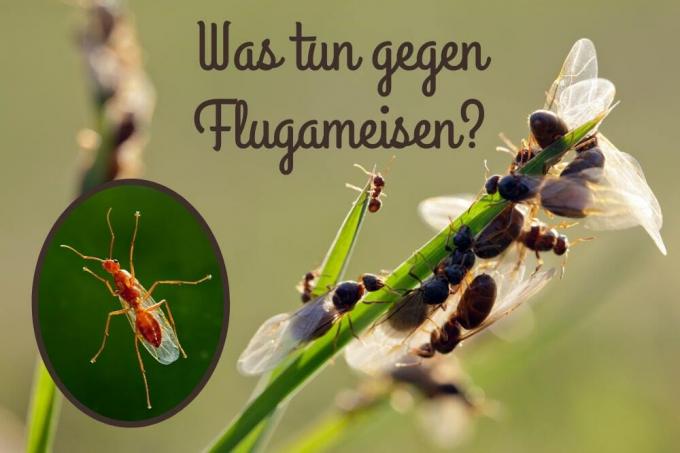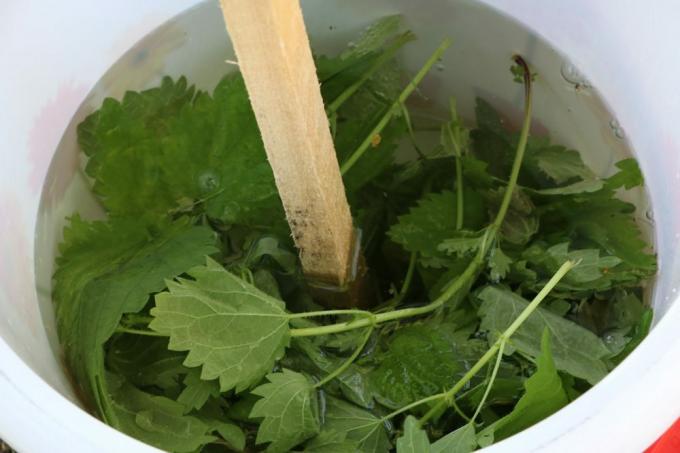
table of contents
- Drive flying ants out of the house
- Defense measures in the garden
- Stay away from these resources
- When to consult a professional?
- Preventing pest from flying ants
- frequently asked Questions
Even if winged ants can be very annoying, they are not pests, on the contrary. It becomes particularly uncomfortable when they penetrate into the house. Then good advice is expensive.
In a nutshell
- Flying ants are normal ants and not a species of their own
- Wings are only worn by sexually mature males and future queens on their nuptial flight
- The wedding flight is in May and usually lasts two to three days
- After that, the males die and the females lose their wings
- Flying ants are particularly problematic indoors, less outdoors
Drive flying ants out of the house
Probably everyone has had them in the apartment before, just normal ants. You have a preference for sweets and butchery. Once in the house, they send out scents, which attracts even more ants. While ordinary ants can sometimes cause damage on or in the house, they are just a nuisance on their wedding flight. In many cases, however, the problem solves on its own, because after two to three days they will disappear again. Unfortunately, this is not always the case and you have to come up with something to get rid of them.
Find and eliminate nesting opportunities
The origin of all evil is undoubtedly the nest, this is where the enthusiasm begins. Consequently, it makes sense to track down the nesting sites and then remove them.

- Nesting sites are often created in rotten wood
- Or in leaky and slightly damp areas in and around the house
- Nest at the end of the ant route
- Block all possible entrances to the nest except for one escape route
- Then lay out glue traps
- Alternatively, catch the ants with a vacuum cleaner
- An old nylon stocking as an aid
- Stocking inside resp. attach to the tube of the vacuum cleaner
- Then set the vacuum cleaner to the lowest setting
- Gently vacuum winged ants
- Take off the stocking and keep it closed
- Release animals outside, some distance from the house
Tip: You can also try to drive flying ants out of the house with the help of a blow dryer or a powerful fan.
Lights out with the window open
Flying ants are strongly attracted to light and often find their way into the house. In order to take advantage of this property, you should switch off the lighting in the house in the evening and set up a sufficiently large light source outdoors. Of course, the window should then be open so that the animals can follow the light and leave the house.
Fight with fragrances
Like all ants, flying ants naturally have a sensitive sense of smell. You can make use of this in the case of evictions. Fragrances that ants don't like at all are cinnamon or cinnamon oil, tea tree oil, coffee powder, grated ones Lemon peel, herbs like marjoram, basil, lavender or lavender oil, thyme, or sage Peppermint. Lemon juice, lemon wedges and vinegar are also suitable. Depending on the consistency, the leaves or oils are distributed on the ant trails or the nest is sprinkled with them. sprayed. On the ant trails, these scents act as natural barriers that are supposed to prevent the animals from building their nests nearby and leaving the intensely scented place.

Tip: The scent of cinnamon in powder form should evaporate relatively quickly. In contrast, cinnamon oil smells much more intense and longer.
Defense measures in the garden
Rely on intense smells
Even in the garden, flying ants can be really annoying in places. As in the house, you can take action against them with intense smells. In addition to the fragrances already mentioned, the leaves of lavender, juniper, ferns and tomato plants are ideal.
- Outdoors too foul smelling manure well applicable
- Made from nettles and oregano, wormwood, peppermint or elderberry
- Garlic brews are also effective
- Spray or pour over ant trails and nests
- Ideally apply in spring
- Pour into the entrances of nests from the previous year
- Ants often return to their homes from last year
- Intense stench will prevent them from doing so
- Also works in summer in freshly created nests

A home remedy with a particularly pungent odor is vinegar essence. If you spray them in several places on the ant roads or directly in the burrow, the smell covers the pheromone trail of the ants, which makes them disoriented. The ant burrow is then usually given up quickly. The effect of vinegar essence lasts for several days, depending on the weather.
Tip: Ants can also be kept away with fine lime, a thick line of chalk or baby powder. These home remedies may not score with strong smells, but they usually avoid their alkaline substances.
Consistently fight aphids
Aphid infestation is particularly common in the garden. As we know, an aphid infestation is usually associated with a plague of ants, because ants cherish, care for and defend these pests. The reason for this is the sweet honeydew, a waste product of the lice that attracts the ants. In order to drive them away, the aphids must be consistently controlled. Since these pests mainly attack already weakened plants, it is advisable to use plant strengthening agents and to make the plants more resistant. To combat aphids, u. a. natural predators such as parasitic wasps, lacewings, hoverflies and ladybugs. Manure made from nettle or worm fern manure is particularly effective for combating this. So you kill two birds with one stone, you fight aphids and at the same time you can prevent flying ants.

Use nematodes to deter
Nematodes of the genus Steinernema feltiae are a versatile helper in the garden. They can also be used in the fight against flying ants and possibly prevent the wedding flight from occurring in the first place. These roundworms are applied directly to the nests via the irrigation water.
Relocate flying ants
If the nest is in an easily accessible place, you can also try to relocate it. To do this, fill a flower pot with some soil and wood wool as nesting material. You then place it with the opening facing down on the nest. If this is in danger, the ants and their brood move into the supposedly safe new housing. The move is usually completed after a few days. The pot can be picked up and the crawling contents put down in another place.
Tip: This method of eviction only works on paved surfaces, but not in beds or on the lawn.
Stay away from these resources
Ants with and without wings are useful helpers who take on important tasks in the great outdoors, even if we humans often find them a nuisance. Like all other living beings, they too have a right to exist and can feel pain. Precisely for this reason, you should absolutely avoid home remedies such as baking powder, baking soda and deer horn salt as pesticides. The animals absorb these agents, which then swell up in the body and burst their bodies. They suffer a very painful death. Flying ants can also be driven away or kept away by other much more harmless means.

It is also better to avoid insecticides
More or less poisonous insecticides are also available on the market for almost every problem. They can kill ants with or without wings without any problems. But these agents can also release toxins that pose a serious health risk to humans and other animals. They can be inhaled or ingested with contaminated fruits and vegetables. It is all the more dangerous if you use such agents in the house and pets or small children live there. In the garden you can u. a. Ponds or Damage aquatic organisms living in it. It is better to rely on natural means of control, this also helps the environment.
When to consult a professional?
If none of that helped and the ants population is getting out of hand or it is perhaps a dangerous species that damages wooden parts, you should seek advice from a professional. Even if this is not accessible or difficult to access, for example, you should hire a specialist to control or relocate. However, if flying ants become a problem year after year, it is all the more important to leave the appropriate measures to experts.
Preventing pest from flying ants
In view of the comparatively small time window between the end of the winter dormancy and the beginning Ant nests in the garden, in or around the house, do not become nests immediately perceived. So it can happen that they set course for the inside of the house unnoticed. However, this can be prevented with appropriate measures.

- Block all access routes into the house
- Equip windows, balcony and patio doors with fly screens
- Seal cracks, crevices and joints in masonry, windows and doors
- Both on the outside and inside walls
- Replace old window seals if necessary
- Keep windows closed when the lights are on, especially during the mating season
- Do not leave food and drinks open
- Applies to all potential feed sources
- Always clean the dog and cat's bowls
- Keep trash cans locked
- Watch out for aphid infestation in indoor and garden plants
- If available, start fighting immediately
frequently asked Questions
The lifespan depends on gender. While the males die shortly after mating, the females have a significantly longer lifespan as queens. Depending on the type of ant, they can live up to 20 years. The young queens in particular incessantly produce offspring year after year.
The wings form both male ants and future queens, and only during the mating season for the so-called wedding flight. It only lasts a few days. After mating, the males die and the females lose their wings.
Flying ants come into the house through crevices and cracks and, of course, open windows. As a rule, they are attracted by the wide range of foods that can be found in every household, especially foods that contain sugar and protein.



